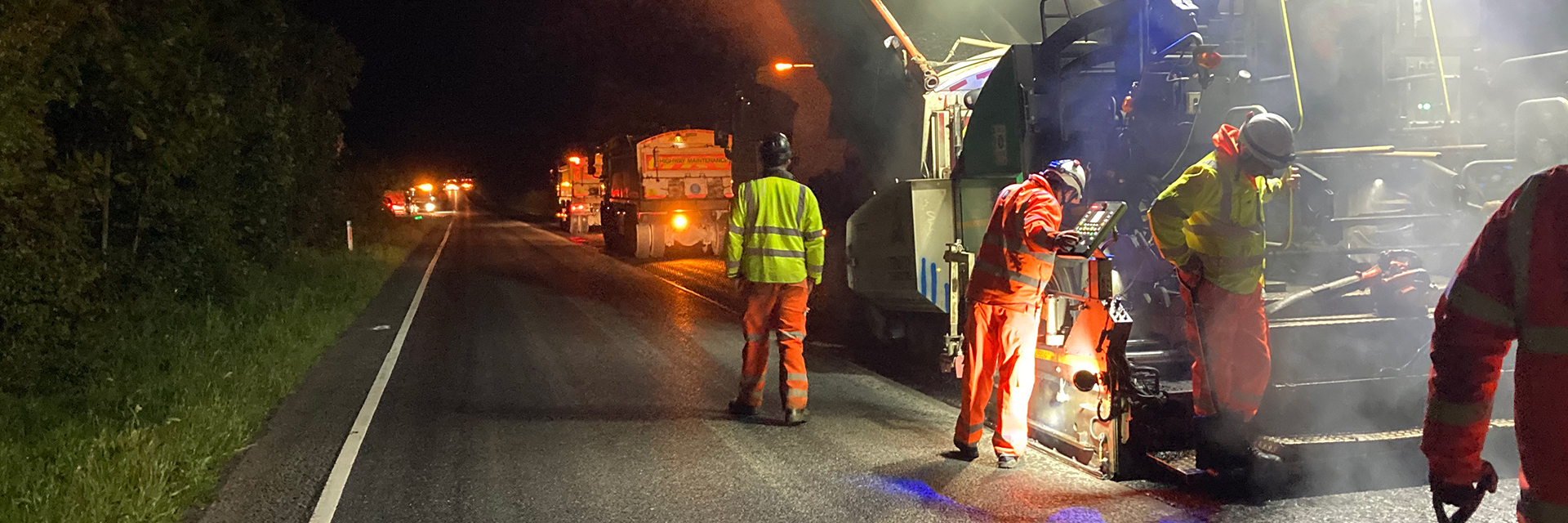National Highways CarbonLock Trials
Product CarbonLock polymer modified bitumen asphalt
Main contractor Heidelberg Materials Contracting
Design consultant AtkinsRéalis Jacobs Joint Venture
Client National Highways
Project overview
Heidelberg Materials and AtkinsRéalis Jacobs Joint Venture have partnered with National Highways to extend trials of biogenic binders on the strategic road network to include warm mix asphalt and up to 30 per cent reclaimed asphalt. The trials took place on the A2 in Kent and A34 in Berkshire and the trial sections will be closely monitored to review performance and whole-life carbon reduction.
Project description
National Highways has extended its trials of bio-binders as part of its commitment to testing innovative lower carbon asphalt solutions to help meet its 2040 net zero carbon deadline for construction and maintenance activities on the SRN.
Two separate trials have taken place – on the A2 near Canterbury in Kent and the A34 near Newbury in Berkshire – using Heidelberg Materials’ CarbonLock asphalt containing polymer modified bitumen (PMB) bio-binders. Trial sections have been produced as both hot mix and warm mix asphalts and contain up to 30 per cent reclaimed asphalt (RA) to test the feasibility of various configurations to provide a circular, lower carbon, Clause 942 thin surface course solution.
Bio-binders contain natural biogenic material, which absorbs and stores CO₂ throughout its life, which is then ‘locked’ within bio-binders and not released back into the atmosphere, even when the asphalt is recycled. In addition, the PMB binder used in the trials is expected to enhance durability and further extend the life of the asphalt, reducing the frequency of maintenance interventions.
The trials on the A2 and A34 follow the success of those carried out on the A30 Devon in 2023 as well as extensive lab-based testing at the University of Nottingham in conjunction with AtkinsRéalis Jacobs Joint Venture (JV).
On the A2, four sections, each comprising of a 45mm surface course and varying from 700 to 1,000 lane metres in length, were carried out as part of the National Highways – A2 Kingston Scheme. They are:
- A control section using conventional WMA with a standard PMB;
- CarbonLock PMB asphalt produced as hot mix asphalt;
- CarbonLock PMB asphalt produced as WMA; and
- CarbonLock PMB asphalt containing 20 per cent RA produced as WMA.
The A34 trials, carried out as part of the National Highways – A34 SB South Isley to Beedon Scheme, replicated these and added a fifth section: CarbonLock PMB asphalt containing 30per cent RA produced as WMA. The old planed out road surface was reused to supply the RA in both the 20 per cent and 30 per cent trials on this scheme, making it a truly circular solution.
The A2 trials used over 1,500 tonnes – and the A34 around 500 tonnes – of CarbonLock asphalt, reducing the carbon emissions associated with the asphalt by around 26 per cent.
The work was coordinated by AtkinsRéalis Jacobs JV as part of the National Highways research project Future Asphalt Surface Course Linking to NH Net Zero under SPaTS 2. The trial sections are undergoing extensive laboratory testing and are being closely monitored to see how they compare with ‘standard’ PMB asphalt used in the control sections in terms of performance and whole-life carbon reduction.
Umesh Parajuli, Senior Advisor (Pavements) in the Safety Engineering and Standards Division, National Highways, said: “The performance of the CarbonLock asphalt laid on the A30 has been excellent and now the second phase of the trial is looking at using bio-binders in conjunction with other low carbon innovations such as WMA and RA as well.
“We hope these trials will help to bring innovative low carbon asphalt solutions using bio-binders into our specification.”
Michael Wright, Technical Director at AtkinsRéalis, added: “It is critical for the industry to explore and test innovative solutions which contribute to the UK’s net zero commitments. The extension of this trial is testament to success of extensive collaboration across the supply chain and academia, in partnership with National Highways.”


